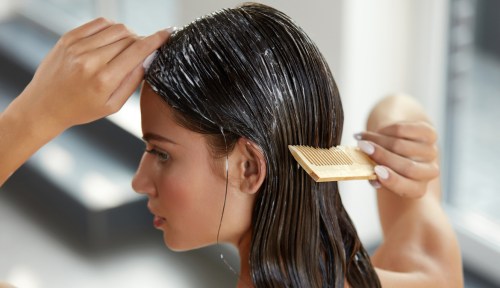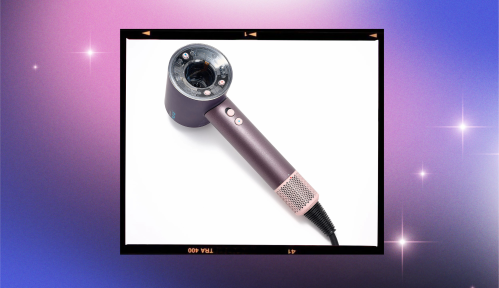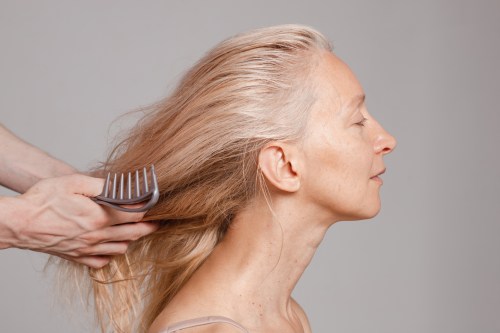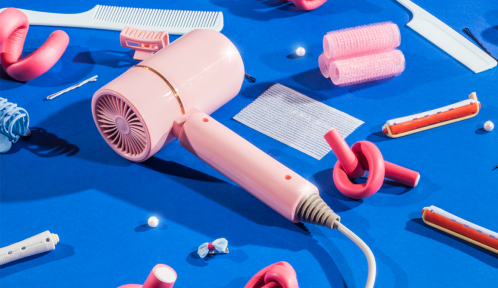Stylists Warn That Leaving Your Hair Mask in for Too Long Can Cause a Whole Lot More Harm than Good
Can you leave a hair mask on too long? Stylists explain what happens when you give your hair too much of a good thing.

Every time I apply a hair mask, I go ahead and ignore all of the “leave in for 8-15 minutes” instructions on the label. In my own little world, hair masks can be applied for hours at a time as I run errands, hit a workout, clean my apartment, etc. At times, I even sleep with my hair masks, even if they’re not branded as overnight masks.
However, it recently came to my attention that there’s a reason for instruction labels (shocker!): If a mask isn’t applied properly, there can be negative side effects, like protein buildup, hair damage, breakage, and more.
What happens if you keep a hair mask in for too long?
According to trichologist Isfahan Chambers Harris, MPH, PhD, “Leaving a mask in too long may result in residue build-up, over-conditioning, weakened hair, and irritation or sensitivity. “
When the hair is wet, some cuticles begin to open, making the hair more sensitive,” says Sachie Kumagai, a master colorist at Warren Tricomi salon in New York City. “Sensitive hair is more prone to damage than dry hair, so there’s a risk of negative effects when leaving a hair mask on for an extended period.”
Prolonged active ingredient exposure on wet hair increases the likelihood of damage—especially if your hair is already in a compromised state with dryness and breakage—so it’s best to follow the recommended time directions to avoid these issues.
Moisture masks
The amount of potential damage you can do to your hair by leaving a mask in too long largely depends on the formula you’re using. Moisture masks, for example, can add some much-needed hydration to your hair, but it is possible to get too much of a good thing.
“Over time, you can experience product buildup,” says Dr. Chambers Harris. “If the product contains ingredients like proteins or keratin, this can lead to over-proteinization, causing your hair to become brittle and break. You also can have an allergic reaction.”
Celebrity hairstylist Andrew Fitzsimons echoes these sentiments. “Leaving a moisturizing hair mask on for too long can lead to what is known as moisture overload,” he says. “This creates an imbalance between protein and moisture in your locks, which can weaken and damage your strands.”
That said, moisture masks probably won’t cause quite as much damage as other types of formulas if you try to stretch their treatment time—just make sure you look at what’s in them. “Mild ingredients such as oils, aloe vera, humectants like honey, all can stay on your hair for a long period of time as long as you don’t have a sensitivity,” says Dr. Chambers Harris.
Repair masks
While leaving a bond-building mask in for an extended period can provide more time for the ingredients to work on repairing and reinforcing the hair’s bonds, it can potentially do more harm than good. “The negative effects are protein overload, which can make hair overly rigid, brittle, and prone to breakage, and also product buildup,” says Dr. Chambers Harris. “An oversaturation of product doesn’t allow for the formula to effectively repair the bonds of the hair,” adds Fitzsimons.
It’s important to keep in mind that both moisturizing and bond-building masks only work for a certain amount of time. “Masks that contain high amounts of protein definitely need to be washed out within the time frame that the manufacturer recommends,” says Dr. Chambers Harris.
Glazes and glosses
Glossing or glazing masks, which are often used to enhance hair color, add shine, or improve overall hair health, are typically formulated to be left on for specific durations as directed by the manufacturer. According to Fitzsimons, if kept on for an extended period, you may notice enhanced shine and deep conditioning, but you may also observe uneven color, overprocessing, and build-up.
Keeping these formulas on for too long can result in a darker hair color than initially desired. “Similarly, if you remove it too quickly, the pigment won’t have enough time to adhere to the strands, resulting in hair that is lighter than originally desired,” says Fitzsimons. Most glazes and glosses contain strong chemicals, so it is always best to adhere to the recommended time or less.
“I would say the most pressing ingredients that need to be washed out within a time frame are the ingredients in a hair gloss or glaze as some contain sulfates or parabens, which can cause irritation, dryness, and other issues related to the scalp,” says Fitzsimons. “With that being said, semi-permanent glosses do not penetrate the scalp, meaning they are still perfectly safe.”
TL;DR: Follow the instructions!
Sign Up for Our Daily Newsletter
Get all the latest in wellness, trends, food, fitness, beauty, and more delivered right to your inbox.
Got it, you've been added to our email list.










